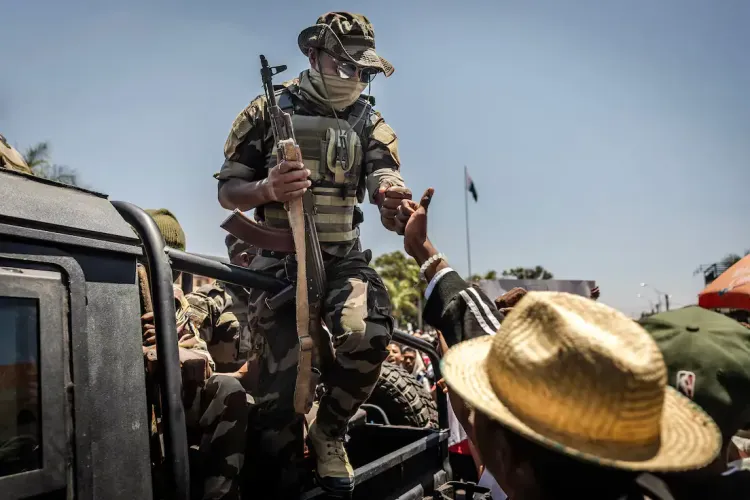Madagascar in Crisis: President Andry Rajoelina Flees Amid Military Rebellion and Gen Z-Led Protests
Antananarivo, Madagascar — The political crisis in Madagascar has reached a breaking point as President Andry Rajoelina announced from an undisclosed location that he has fled the country, claiming he fears for his life after elite troops joined nationwide anti-government protests. The rebellion, led by disillusioned youth and joined by a key military faction, has plunged the island nation into its most serious political turmoil in over a decade.
The unrest began in late September 2025, with Gen Z-led demonstrations over chronic power outages, water shortages, and economic hardship. The protests quickly gained momentum, echoing similar youth movements in Nepal and Indonesia. According to reports, at least 22 people have been killed and more than 100 injured in clashes across the capital, Antananarivo.
The crisis escalated sharply when members of CAPSAT, the same elite military unit that helped Rajoelina seize power in a 2009 coup, defected to the protesters’ side. Soldiers demanded the resignation of the president and key ministers, calling the administration corrupt and incompetent. The move shocked the nation and symbolized a major shift in military allegiance, as CAPSAT had historically been one of Rajoelina’s strongest supporters.
President Rajoelina’s Response: “An Illegal Attempt to Seize Power”
In a delayed late-night broadcast—reportedly postponed because soldiers attempted to seize the state broadcaster’s facilities—Rajoelina denounced the rebellion as an “illegal attempt to seize power.” While he stopped short of resigning, he confirmed that he had left the capital “to protect his life” and called for “dialogue and respect for the constitution.”
Unverified social media reports suggest Rajoelina may have sought refuge in the French embassy before being evacuated by a French military jet, possibly to Dubai. The French government has not confirmed these claims.
Timeline of Key Events in Madagascar’s Political Crisis
| Date | Event | Details |
|---|---|---|
| Late Sept 2025 | Protests Begin | Youth-led demonstrations erupt over power and water shortages; 22 deaths reported. |
| Early Oct 2025 | Escalation | Rajoelina appoints army general as Prime Minister; protests intensify. |
| Oct 11, 2025 | Soldiers Join Protest | CAPSAT unit defects, demanding resignations of top officials. |
| Oct 12, 2025 | Coup Warnings | Rajoelina flees to undisclosed location amid coup fears. |
| Oct 13, 2025 | Presidential Address | Delayed speech airs after military seizes broadcaster; president’s whereabouts unclear. |
| Oct 14, 2025 | Ongoing Unrest | Reports of military control and international monitoring. |
Historical and Political Context
Madagascar, an Indian Ocean island nation long plagued by political instability, has experienced multiple coups and contested transitions since gaining independence. Rajoelina, a former DJ and media entrepreneur, first rose to power in 2009 through a military-backed coup. He was later elected president in 2018 and re-elected in 2023, but his administration has faced growing criticism over governance failures, inflation, and corruption.
The involvement of CAPSAT—the same unit that helped Rajoelina overthrow his predecessor, Marc Ravalomanana—adds a deeply ironic twist to the crisis. Analysts suggest this reversal highlights fractured loyalties within the military and dwindling elite support for the president.
International Reactions and Regional Implications
The African Union, France, and United Nations have expressed concern, urging calm and constitutional order. Given Madagascar’s strategic position in the Indian Ocean and historical ties with France, the crisis could have regional ripple effects, influencing security dynamics in Southern Africa.
Meanwhile, social media continues to fuel speculation about Rajoelina’s fate and the possible formation of a transitional government. Online narratives portray the protests as part of a broader youth-driven movement for democratic renewal across Africa.
What’s Next for Madagascar?
With Rajoelina in hiding and the military’s loyalty divided, Madagascar faces an uncertain future. Observers warn that unless dialogue resumes, the nation risks sliding into another power vacuum or military-led transition.
The unfolding events underscore the fragility of democratic institutions in post-coup societies—and the growing influence of youth movements demanding accountability, transparency, and reform.
